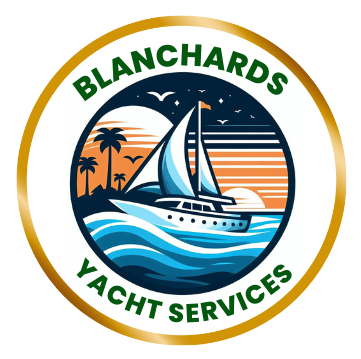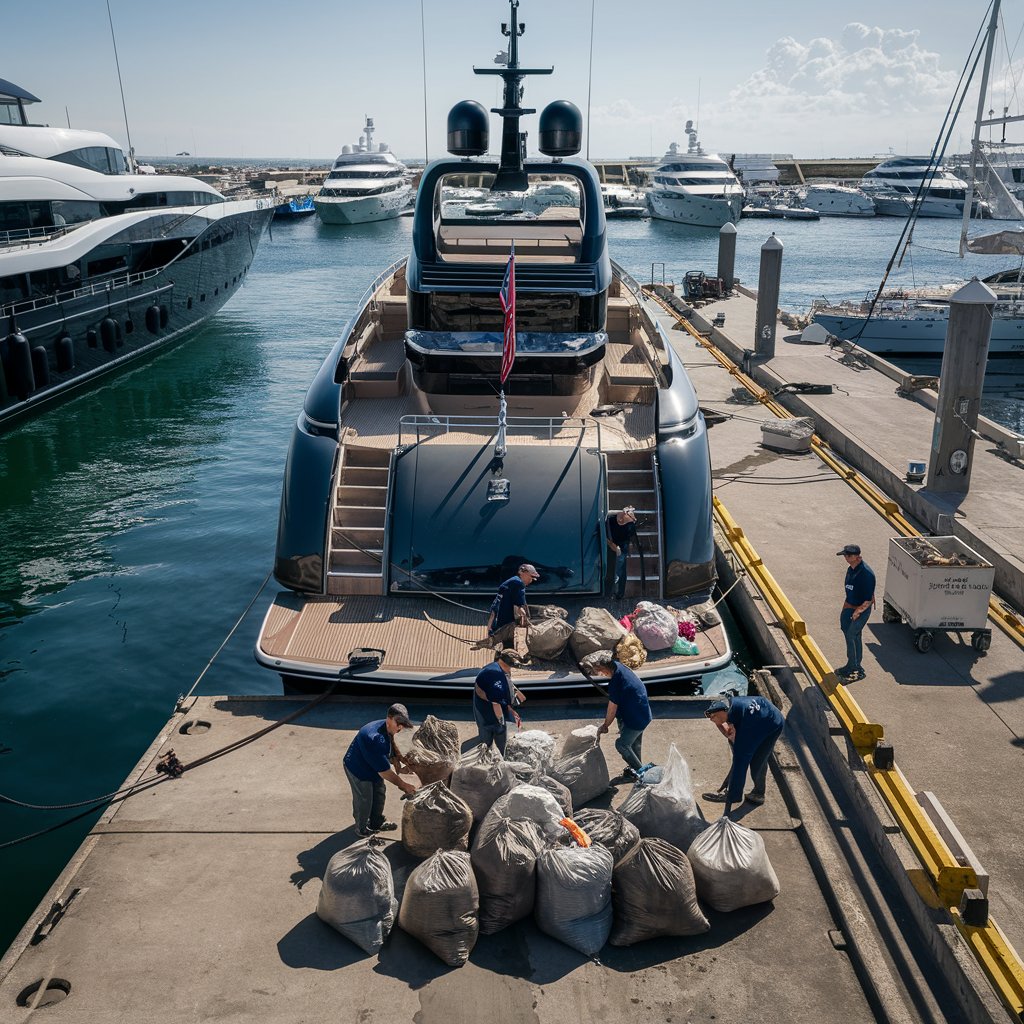Superyachts, with their luxurious amenities and global reach, must adhere to strict waste disposal regulations to protect the marine environment. However, the adequacy of these regulations and their enforcement, especially in international waters, remains a subject of debate among maritime professionals.
The International Convention for the Prevention of Pollution from Ships, or MARPOL, sets the stage for regulations on waste disposal among various types of vessels, including Superyachts. As luxury vessels with global reach, superyachts need to pay close attention to these rules to minimize their Environmental Impact.
Does MARPOL Apply to Yachts?

Yes, MARPOL applies to yachts, including superyachts, as it is an international convention that governs the prevention of pollution from Ships of All Sizes. While MARPOL is often associated with large commercial vessels, its regulations are also relevant to private yachts, particularly those exceeding a certain tonnage or length.
Furthermore, MARPOL Annex V, which deals with the prevention of pollution by garbage from ships, applies to all vessels, meaning yachts must adhere to the same standards for waste disposal as larger ships. This includes proper segregation, storage, and disposal of waste, as well as maintaining a Garbage Management Plan and a Garbage Record Book.
Compliance with MARPOL is not just a legal obligation but also a crucial aspect of responsible yachting, ensuring that even the most Luxurious Vessels operate with minimal environmental impact. For superyachts, which often cruise in Pristine and Sensitive Marine Environments, adherence to MARPOL is particularly important in preserving the health of the oceans.
MARPOL Annex V regulations apply across the board to all kinds of waste: plastics, food waste, and even hazardous materials. For superyachts, this means stringent guidelines must be followed to ensure waste is managed properly. Ignoring these can lead to Serious Repercussions not just for the environment but also for the vessel’s operating credentials.
The Marina Dockmaster signs the MARPOL document handed to him by the yacht’s Chief Engineer, ensuring compliance with environmental regulations.

The variety and volume of waste generated by superyachts can be quite significant. We’re talking about high-end kitchens generating food waste, guests’ waste like plastics and other packaging, and even hazardous materials from maintenance activities. MARPOL aims to keep all of this in check, ensuring that the Vast Oceans remain clean and safe.
Understanding MARPOL and adhering to its guidelines isn’t just about compliance; it’s about committing to sustainable practices that protect marine ecosystems. For yacht operators, staying informed and updated on these regulations is essential to maintain operations without legal hiccups.
Challenges and Innovations in Enforcing Waste Disposal Regulations
Managing waste disposal on superyachts comes with unique challenges. The current regulations under MARPOL are robust but may not fully address the complexities involved with superyacht operations. More specific guidelines tailored to these high-capacity vessels could enhance compliance and environmental protection.
Enforcement is a significant challenge, especially in international waters. While coastal states can enforce regulations within their exclusive economic zones (EEZs), the situation becomes more complex beyond these boundaries. In such international waters, the responsibility falls on the flag state of the vessel. The effectiveness of enforcing waste disposal regulations varies widely among different flag states, raising concerns about consistent compliance across the industry. If you’re traveling to an unfamiliar territory, it’s advisable to speak to the relevant authorities prior to your arrival, or consult a Yacht Agent who can provide valuable insight on the yachting regulations.

Unlock your potential with Fiverr, the world’s leading marketplace for freelance services. Whether you’re looking to hire a skilled professional for your project or showcase your own talents, Fiverr connects you with a global community of experts across various fields. From design and marketing to writing and tech, find the perfect freelancer to bring your vision to life, all with flexible pricing that fits your budget. Click Ad below and Go Pro to Start transforming your ideas into reality today with Fiverr!
Technological innovations are offering promising solutions to these enforcement challenges. Advanced waste management systems onboard superyachts can help reduce waste volume and process it in an environmentally friendly manner. These systems include everything from sophisticated waste separation units to compactors and incinerators, making it easier to manage waste responsibly even when Far From Shore.
Best practices can also play a vital role. Emphasizing waste minimization, promoting recycling, and opting for environmentally friendly products are all strategies that can reduce the environmental impact. Crew Training is crucial; a Well-Informed Crew can make a significant difference in adhering to regulations and implementing sustainable practices effectively.
Exceptions Regarding the Disposal of Garbage at Sea
Under MARPOL Annex V, the disposal of garbage at sea is generally prohibited, with strict regulations in place to prevent pollution. However, there are specific exceptions to this rule, particularly in situations where it is necessary to protect the safety of the ship or those on board. For instance, if the garbage presents an immediate threat to the vessel or its crew—such as hazardous materials that could compromise the vessel’s stability or fire safety—it may be legally discharged into the sea. Such actions must be recorded in the Garbage Record Book, noting the nature of the emergency and the reasons for disposal.
Additionally, certain types of waste may be discharged under controlled conditions, depending on the type of material and the distance from the nearest land. For example, food waste that is ground to a specific size may be discharged at least 3 nautical miles from the nearest land, provided the vessel is en route and not stationary. Similarly, non-harmful substances, such as certain cargo residues that are not considered hazardous to the marine environment, may be disposed of under strict regulations. These exceptions are designed to balance environmental protection with the practical needs of maritime operations, but they also highlight the importance of clear guidelines and proper record-keeping to prevent misuse or negligence.
Disposing of Black and Grey Water at a Marina Pumpout System

Proper disposal of black and grey water is a crucial aspect of maintaining environmental standards on yachts. Black water, which comes from toilets, and grey water, from sinks, showers, and galley drains, contain contaminants that can significantly impact marine ecosystems if released untreated into the sea. To prevent such pollution, many marinas are equipped with pumpout systems that allow yachts to safely and efficiently offload these wastewater types.
Using a Marina pumpout system ensures that black and grey water are directed into municipal or private treatment facilities, where they can be processed and treated according to environmental regulations. This practice not only helps to protect sensitive marine environments but also aligns with international standards such as those outlined in MARPOL, which restrict the discharge of untreated sewage in most coastal areas. For yacht operators, utilizing marina pumpout systems is a responsible and essential measure to reduce their environmental footprint while cruising.
Looking ahead, the need for improved and more specific regulatory guidelines for superyachts is clear. Encouraging industry-wide adoption of innovative technologies and best practices will be crucial. With ongoing advancements and a collective commitment to environmental sustainability, the superyacht industry can continue to enjoy its luxurious lifestyle while safeguarding the oceans for future generations.
**Our Website contains affiliate links. This means if you click and make a purchase, we may receive a small commission. Don’t worry, there is no extra cost to you. It’s a simple way you can support our mission to bring you quality content**.

Discover a world of opportunities at The Netwrk, where creators, innovators, and entrepreneurs connect to turn their passions into thriving businesses. Whether you’re looking to collaborate with industry leaders, gain valuable insights, or find the tools to elevate your brand, The Netwrk is your ultimate platform for growth. Click HERE to Join today and take the first step towards building the future you’ve always dreamed of!



Troy, another great article, just like your last one on running a shipyard! The insights you’ve provided about waste disposal regulations for superyachts are both timely and essential. I’m curious about your thoughts on a couple of things. Given the challenges of enforcing MARPOL regulations in international waters, do you think there’s a need for more robust international cooperation or perhaps even new guidelines specifically for superyachts? Also, with the technological innovations you mentioned, such as advanced waste management systems onboard, how accessible are these technologies to smaller yacht operators? Can they also benefit from these innovations, or are they primarily tailored for larger vessels? Looking forward to hearing your perspective on these!
Opa
Hello Opa
Thank you for the kind words! I agree that enforcing MARPOL regulations in international waters can be challenging, and I do believe there’s a growing need for more robust international cooperation, possibly with updated guidelines tailored to superyachts.
As for technological innovations in waste management, while they’re currently more common on larger vessels, there’s a trend toward making these systems more accessible to smaller yachts. With continued advancements, I anticipate that even smaller operators will increasingly benefit from these innovations, helping to improve environmental compliance across the board.
The topic of waste disposal regulations for superyachts raises several intriguing points about environmental responsibility and the challenges of enforcement in international waters. Given the complexity of adhering to MARPOL guidelines, particularly for superyachts, I’m curious about the community’s perspective: What are the most significant challenges yacht operators face in complying with these regulations? Do you think current technologies adequately support sustainable waste management on superyachts, or is there a need for further innovation? Additionally, what role do you believe crew training plays in enhancing compliance and environmental awareness onboard? Let’s discuss these aspects and explore possible solutions to ensure that the yachting industry can balance luxury with environmental stewardship.
Hello Rach
Thank you for your insightful feedback on waste disposal regulations for superyachts. The most significant challenges yacht operators face in complying with MARPOL guidelines often include the complexity of navigating different jurisdictions and the high costs associated with waste management technologies. While current technologies provide some support for sustainable waste management, there is certainly room for further innovation, particularly in improving waste treatment systems that can operate efficiently in limited spaces.
Crew training plays a crucial role in enhancing compliance and environmental awareness onboard, ensuring that best practices are consistently applied. By focusing on continuous education and the development of more advanced technologies, the yachting industry can better balance luxury with environmental responsibility.
Thanks again
you’ve done it again with another insightful article! Your expertise on waste disposal regulations for superyachts is particularly relevant right now. I wanted to ask your opinion on a couple of points. Considering the difficulties in enforcing MARPOL regulations in international waters, do you see a need for enhanced global collaboration or perhaps the introduction of new guidelines specifically tailored for superyachts?
Hello Isaac
Thank you for your kind words! I do believe that enhancing global collaboration is essential for effectively enforcing MARPOL regulations, especially in international waters. The introduction of new guidelines tailored specifically for superyachts could help address unique challenges they face, such as varying waste capacities and extended stays in remote locations.
These could include stricter reporting requirements and better waste management support at marinas worldwide.
Thanks again